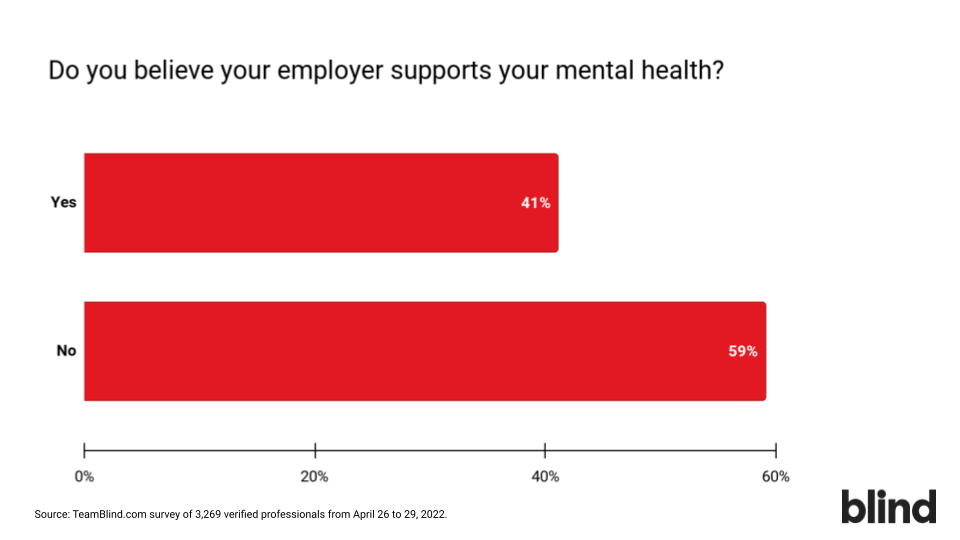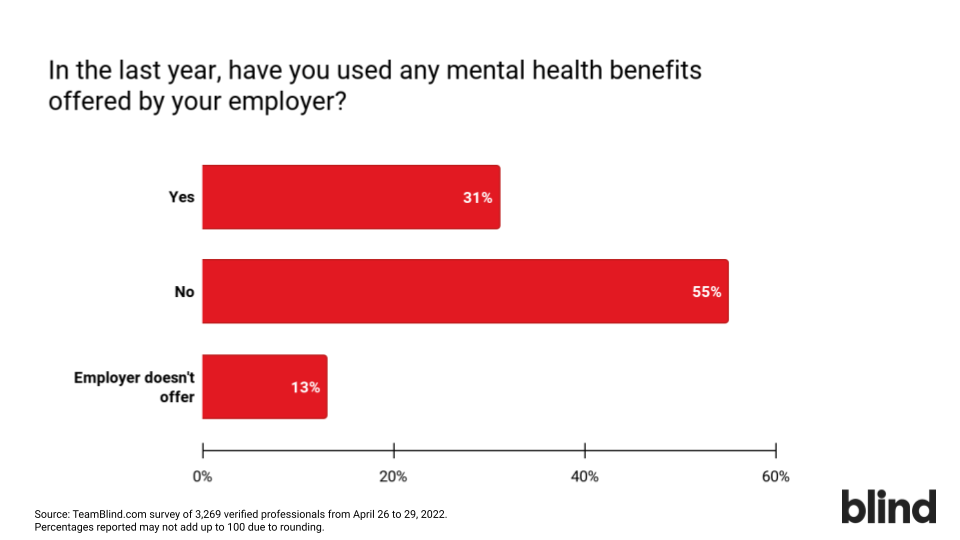59% of Professionals Say Employers Need to Do More to Support Their Mental Health

We just cannot seem to catch a break. As we learn to live with one pandemic, it is becoming increasingly clear there is another pandemic looming.
Many people endured once-in-a-lifetime changes in the last two years, and it has taken a toll on our mental health and collective psyche.
For some, work has only exacerbated problems. About three out of five professionals in the U.S. (59%) do not believe their employer supports their mental health, according to a survey of 3,269 professionals on the professional social network Blind. Despite many employers’ recent investments in employee mental health, only 41% felt supported by their company.

“Over the past two years, we’ve experienced a massive shift in how we work,” said Danielle Poonoosamy, the director of people and culture at Alma, a membership-based network for mental health care providers. “It’s no longer enough to say that workplace culture happens in the four walls and hundreds of desks of an office location.”
Perhaps unsurprisingly, some companies that fared the worst in mental health have suffered everything from recent layoffs to employees upset with return-to-office plans or a lack of work-life balance.
Nearly all of the professionals at T-Mobile (97%) said their employer does not support their mental health. Employees at Amazon, Goldman Sachs, Robinhood and Tesla fared no better.
“Organizations have to be flexible, and they have to give their people flexibility in order to support their workforce,” advised Poonoosamy.
What employers can do to support employee mental health
Most large employers offer generous perks or robust employee benefits, many of which provide mental health support. However, Blind’s analysis found that the company benefits go unused by a majority of professionals.
Employers could do a better job of educating their employees about the benefits available.

Some 13% of employees at some of the largest and most well-resourced companies, including Apple, DoorDash, JPMorgan Chase, PayPal and more, claim their companies do not offer any mental health benefits, even though many of these companies offer employee assistance programs or similar plans.
“I’m sure the U.S. employee benefits include an Employee Assistance Program (EAP) that offers free counseling/therapy sessions a few times a year to employees,” a verified Amazon professional shared with a struggling coworker on Blind. “I recommend it highly for those who need someone to talk to but aren’t sure if therapy is right for them.”
A verified Goldman Sachs professional agreed on Blind, noting the availability of a similar program at the investment bank, which offers up to six free sessions with a therapist.
“Talking to someone really, really helps in the period of time when you feel mentally overwhelmed even when you know what your problems are,” reflected the banker.
Employee assistance programs provide assistance, check-ins, evaluations and referrals for personal situations ranging from adoption and family life to legal or wellness matters. Support is typically accessible at no cost to employees and select family or household members, according to the Society for Human Resource Management, a professional association for human resources professionals.
Other companies redesigned employee benefits programs to give mental health and employee flexibility top billing.
Alma gives its employees a monthly therapy stipend worth more than $1,400 a year to choose a personal therapist. The allowance is in addition to a monthly wellness stipend, which employees can use toward things like massages, workout classes or spa treatments.
“We cannot define what mental health and wellness look like for our employees. Rather, we have to give them resources,” noted Poonoosamy, referring to the open-ended nature of the company’s employee benefits.
Employees don’t use mental health benefits at work
A majority of professionals surveyed by Blind (55%) have not used any mental health benefits offered by their employer in the last year.
Some experts believe the stigmatization of mental health may be to blame.
“As leaders, we need to normalize mental health and create an environment where people feel comfortable talking about it. At Alma, you’ll find employees across all levels block off an hour for therapy on their work calendar,” explained Poonoosamy. “When you see a vice president block off therapy on their calendar, you feel like you can do that too. It’s not only accepted; it’s also encouraged and celebrated.”
Similarly, an overhaul or addition of new employee benefits may not be necessary. Companies might also want to consider making mental health part of everyday workplace conversations or take the time to better educate employees about existing policies, such as paid time-off, flexible work schedules or allowances for remote work.
The result may reduce employee burnout and better mental health.
“Mental health care is a basic human right,” said Poonoosamy. “When our employees are supported, everything else will fall into place. We’ll see they’re more engaged, more productive and more fulfilled at work.”
The bottom line
While many employers offer mental health benefits, often for no or low cost, most professionals have not used them in the last year, according to a new analysis from Blind. Employers could do more to educate their employees about the resources and policies in place to promote better mental health in the workplace.
Methodology
Blind conducted an online survey of 3,269 verified professionals in the U.S. on its platform from April 26 to 29, 2022, to understand employer support for mental health. Percentages reported may not add up to 100 due to rounding.